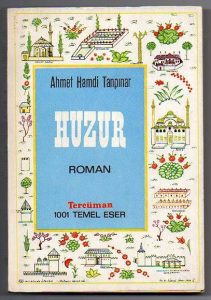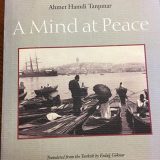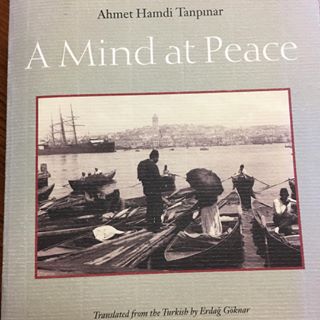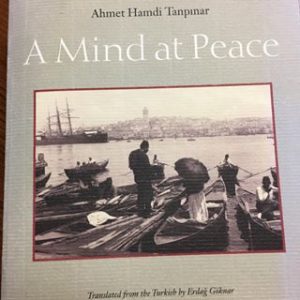A Mind at Peace (Huzur) – Ahmet Hamdi Tanpınar – 1948

Posted by Steven on 5/8/2012, 23:35:28
Just finished it. What an amazing book! At times I wasn’t sold on it, but eventually I couldn’t put it down, and I wound up flagging more passages for discussion than perhaps any book we’ve read. The ending is both ominous and bizarre.
~
Posted by guillermo maynez on 8/8/2012, 10:48:34, in reply to “Re: A Mind at Peace (non-spoiler)”
***SPOILERS***
I concur with Steven in finding the ending ominous and bizarre. What will happen to poor Mumtaz? Did Ihsan die? Will Nuran remain with her ex-husband for the sake of the (unlikable) Fatma? How can it be translated as “A Mind at Peace”? Is that the literal translation?
I must say I liked the book very much, including the long poetical ramblings. For all the obscure cultural references, the narrative is fluid and interesting. Mumtaz is a likable guy, although certainly he can be dense, oversensitive, and intense. Nuran seems to be nice, but she feels a lot of pressure from her family, ex-husband and daughter, and one feels sorry to have to admit that, when Nuran needs him the most, Mumtaz is weak. When she’s looking for a strong arm to support her, Mumtaz bends to his sensitivity and lets her down.
I wanted them to stay together, but the situation wasn’t easy. And, of course, Suad (horrible man!) didn’t help by doing the disgusting thing he did. Just initial perceptions, hope to read yours.
~
Posted by Steven on 16/8/2012, 9:50:31
The early sections draw a clear parallel between Mümtaz’s personal life and the dilemma of Turkey as a whole on the eve of another world war.
There is one passage (pages 105-106 of the Archipelago edition) where Mümtaz is talking with Suad and Ihsan about global affairs, all the while preoccupied with his own thoughts of Nuran. The key question keeps coming up: “Okay, then, what is it that should be done?” Ihsan’s answer is not meant to be as flippant as it sounds when he says “First we drink….”
Ihsan is saying that in times of doubt and crisis, we fall back on the reassuring patterns of daily life and the social fabric that sustains us.
Earlier there is an italicized passage (p. 22) that follows the description of children playing and singing:
What should persist is this very song, our children’s growing up while singing this song and playing this game…. Everything is subject to transformation; we can even foster such changes through our own determination. What shouldn’t change are the things that structure our social life, and mark it with our own stamp.
I find this view rather ironic considering Turkey had undergone as thorough a social transformation in a single lifetime as any country in history, going from an Islamic monarchy to a secular republic, and changing its outlook from East to West, even adopting a new alphabet and style of dress. This must have brought profound changes at the level of neighborhoods and families.
Another interesting aspect of the book is that there is constant talk about Turkey being brought into the coming war, but not on whose side. It seems to be implied in a couple of places that it is on England’s side, but not clearly enough to be sure.
~
Posted by Lale on 27/8/2012, 16:45:47, in reply to “Re: A Mind at Peace (spoiler)”
I finished the book and I must say I intensely disliked it. Half way through, due to my dislike, I started to make associations with certain politicians, artists and schools of thought (all of which I also dislike). Towards the end, I established the connection between these unsavory movements that have been in progress for a couple of decades (in politics and in arts) and this book that has been written fifty years earlier. I ended up being extremely angry.
The whole purpose of the book is to yearn for the Ottoman Empire and to completely undermine Mustafa Kemal Atatürk’s reforms.
The book starts in year 1939. In 1938 Atatürk died (in Istanbul at the Dolmabahçe Palace) and the whole nation was heart broken. For a book that goes on forever on every aspect of life, culture and art in Istanbul, and of history and geography and world matters, it is unthinkable tor it to not mention Atatürk’s death which was a very very important time in nation’s history, it can only be on purpose. And I do not like people who do not respect Atatürk, period.
: Another interesting aspect of the book is that there
: is constant talk about Turkey being brought into the
: coming war, but not on whose side. It seems to be
: implied in a couple of places that it is on England’s
: side, but not clearly enough to be sure.
Yes, on England’s side. Churchill tried to convince İsmet İnönü (Atatürk’s friend at arms and the first prime minister of Turkish Republic. Inonu became president when Ataturk died.) But Inonu held strong and did not take the nation into war.
This is from 1943, when Churchill came to Adana to convince İnönü to take part in the war:
http://www.okubakim.com/images/stories/inonu_churchill.jpg
Speaking of Churchill, this is what he said when Atatürk died:
“Atatürk’s death is not only a loss for the country, but for Europe is the greatest loss, he who saved Turkey in the war and who revived anew the Turkish nation after the war. The sincere tears shed after him by all classes of people is nothing other than an appropriate manifestation to this great hero and modern Turkey’s Ata.”
~
Posted by Lale on 27/8/2012, 16:55:05
: How can it be translated as “A Mind at Peace”? Is that the literal translation?
The original title of the book is Huzur, which means a state of peace and calm. When you spend and afternoon pleasantly, with a peace of mind and with nothing to bother you, no worries, that is called huzur. If you are worried, if you are annoyed with noisy and hectic environment, that is opposite of huzur.
My Turkish-English dictionary says:
Huzur: 1. Peace of mind, freedom from anxiety. 2. tranquillity, peace, freedom from disturbance/turmoil.
To lie in huzur is to rest in peace.
So the title of the book is quite literally translated but I don’t know how it reflects the end of the story. I agree with you (Guillermo) that the end seems very very huzursuz (without huzur).
More later,
Lale
~
Posted by Steven on 28/8/2012, 10:29:52
The English title has a beautifully appropriate double meaning: (1) Peace of mind, (2) A thinker in peacetime.
Is this the case with the Turkish “Huzur”?
~
Posted by Lale on 28/8/2012, 13:32:10
: The English title has a beautifully appropriate double
: meaning: (1) Peace of mind, (2) A thinker in
: peacetime.
:
: Is this the case with the Turkish “Huzur”?
No, not the second, just the first meaning. It means peace of mind, serenity.
Lale
~
Posted by Steven on 28/8/2012, 10:26:07
: The whole purpose of the book is to yearn for the
: Ottoman Empire and to completely undermine Mustafa
: Kemal Ataturk’s reforms.
Not being attuned to the political issues involved I didn’t see this at all, but I did find it curious that there was so little mention of Ataturk.
Which reforms is the book trying to undermine? Mümtaz and Nuran have lives that seem to exemplify those of a free secular society. Are you saying they’re being held up as bad examples?
~
Posted by Lale on 28/8/2012, 10:34:22
: Which reforms is the book trying to undermine?
For instance the medreses and dervish lodges were closed by Ataturk and these people were very much in favour of dervish lodges and spoke positively of medreses, almost lamenting their closures. They would be happy to know that with the current government all of those are coming back.
: Mümtaz
: and Nuran have lives that seem to exemplify those of a
: free secular society. Are you saying they’re being
: held up as bad examples?
No, all the characters seemed to be well-educated and secular people. All the young women were either going to university or had graduated from university. That’s why I found it very strange that the book in general had this yearning for the past, for the Ottoman Empire. Women could go to university thanks to Atatürk. In the past they yearn, Nuran would have been stoned to live as unmarried lover to Mümtaz.
Republic is never mentioned, it is always the Ottomans.
Lale
~
Posted by guillermo maynez on 23/8/2012, 12:54:12
I’m wondering if Mümtaz and Nuran’s love affair was doomed from the start,and what could be the cause for that: Mümtaz’s weirdness, Nuran’s previous marriage and the child’s rejection of her new boyfriend, social pressure, or a combination of all. What do you think?
~
Posted by Steven on 23/8/2012, 18:33:39,
Good question. Nuran seems to know all along that things aren’t fated to work out well for her, but she goes along with the moment. I’m sure her child’s attitude is a big factor.
p. 237: “He occasionally wondered, ‘Do we love each other or the Bosphorus?’ At other times, he attributed their state of satisfaction and lunacy to the exuberance induced by Ottoman music.”
There is always a danger when dating to get so wrapped up in the pleasures of what you are doing that you don’t consider whether you really love the other person or whether your relationship can withstand the demands of daily life. I think Nuran finally realized that it wasn’t going to work, and Suad was the last straw.
~
Posted by Steven on 25/8/2012, 17:42:05
Here’s the review I posted on LibraryThing. (Incidentally, the only other person to review it there was Lale’s friend Geoffrey Fox. His “review” was just a link to this blog page: http://geoffreyfox.blogspot.com/2011/04/istanbul-memories.html. He gave the novel a maximum possible rating of 5 stars as I did)
“What is it that should be done?” This is the central question of A Mind at Peace at both the public and personal levels. The novel is set on the eve of World War II in Istanbul, Turkey. Its protagonist, Mümtaz, is a young, unmarried academic and would-be novelist. He is principally occupied at the moment, however, with caring for his older cousin İhsan who suffers from what appears likely to be a fatal case of pneumonia. İhsan had been Mümtaz’s guardian and mentor ever since the latter’s parents died as a result of the Greek invasion of Anatolia in 1919–events which Mümtaz recalls at the beginning of the novel.
Mümtaz also reflects ruefully upon his recently broken love affair with Nuran, a divorced woman slightly older than Mümtaz. In the long walks he takes to escape from the sick room, every sight and sound seems to recall the times he spent with Nuran.
After this prologue, the novel shifts back a year or more in time to Mümtaz’s first meeting with Nuran. It is a relationship we know is doomed to failure, but not how or why. In the meantime, the two lovers, enraptured with one another, spend many idle hours in all seasons exploring their city–from palaces to bazaars, from waterways to ancient ruins. Eventually Mümtaz even wonders “Do we love each other or the Bosphorus?”
On a par with their passion for Istanbul is the pair’s enthusiasm for traditional Turkish music. There are lengthy discussions about it, as well as sessions where Nuran’s uncle, a noted vocalist, and his friends perform for guests. (It’s a shame that the novel couldn’t have included a CD to satisfy readers’ inevitable curiosity about the folk music described in such rapturous terms.)
Notwithstanding the love story and travelogue, A Mind at Peace is essentially a novel of ideas. It is August 1939, and the world is obviously on the brink of another great war. The Turks have no reason to expect that they won’t be involved, but should they just let the currents of history carry them into another bloodbath? What is the responsibility of the individual, especially of the intellectual, at times like this? After long talks with his cousin, Mümtaz asks himself: “Maybe İhsan does have a point! This society wants ideas and maybe even a struggle out of me. Not romantic posturing! But to achieve this end must I forget about Nuran?”
There is obviously much of Hamlet’s “To be, or not to be…” in Mümtaz’s dilemma. Readers of Robert Musil’s The Man Without Qualities will also find themselves on familiar ground with a protagonist full of ideas but lacking in direction. In contrast to Mümtaz there is Suad, a key character introduced fairly late in the novel, who is his mirror image: a man of intellectual attainment but impulsive, irresponsible, self-indulgent and proud of his Sadean amorality. Nuran, in contrast to both of these men, is centered on her feelings, her family, and her cultural roots. In the author’s words, “Nuran depended on a minimum level of selfhood. She lived through her milieu.”
A Mind at Peace is a great novel that brings forth ideas of epic scale out of an intimate story, and does so against an unforgettable historical and cultural backdrop. The principal characters, notwithstanding their penchant for philosophical abstracts, are convincingly complete and complex. The author’s prose, beautifully translated, has an evocative and lyrical quality in keeping with the musical theme running through the novel. Here, for example, is a passage describing Nuran:
“Not a single spot existed on her small face with which he wasn’t familiar. For Mümtaz, her face became his panorama of the soul: the way it blossomed to love like a flower, closed definitively upon a despairing smile–the metallic radiance burning in her eyes asquint–and not least of all the way her face changed by degrees like a daybreak over the Bosphorus…. With a look, she dressed him up and stripped him down, at one moment turning him into a pitiful, forsaken malcontent with no recourse but Allah, and at the next into the very master of his fate.”
For both its profound discussion of ideas central to the human condition and its vivid portrayal of a place, a time and a people, A Mind at Peace is highly recommended.
~
Posted by Lale on 28/8/2012, 10:26:57
This is a very well-written review, Steven. A very nice summary. You have written as beautifully as the book. Indeed it is a very lyrical translation. I will receive the Turkish version of the book in September and then I will be able to compare the original with the translation. (See who is more lyrical.)
I know this translator, he is the guy who improved tremendously Orhan Pamuk’s “My Name is Red.” (Orhan Pamuk, Ahmet Hamdi Tanpınar and the translator Erdağ Köknar are all in the same camp in their yearning for a bygone and failed era, and a system that based everything on religion, treated women as second class citizens and was backwards in every way.)
What I liked about the book (the only thing I liked about the book) was Istanbul’s description. It was detailed and took us to many different parts of Istanbul. Bosphorus is indeed extraordinary. I have traveled a lot and I have seen many beautiful places but I have never seen anything like the Bosphorus.
What I did not like:
– Relentless name dropping. From Andrea Del Sarto to Andre Gide, every accomplished artist, composer, philosopher, politician and writer is mentioned. The author’s knowledge is impressive, he has written all of these without the benefits of google, assuming all his references are correct, I am really impressed with his knowledge but I felt like he was showing off. Every page has a famous name in it, it was too much. I mean “this anatomical geometry recalled Pierre Puget’s caryatids in Toulon.” Give me a break! I know where Toulon is but who is Pierre Puget and what are caryatids? Ahmet Hamdi Tanpınar was a literature professor, I am sure he spoke French very well and obviously he has travelled a lot (and probably owned a leather-bound set of Encyclopedia Britannica) but that’s no reason to squeeze everything you know into a novel.
– Likewise, too much detail and way too many names regarding Classical Turkish music. I know and enjoy Turkish music, I know what a “makam” is, I know the difference between “şarkı and “türkü,” and even I was bored. I am surprised you guys were not bored.
Lale
~
Posted by guillermo maynez on 29/8/2012, 13:11:56
First: Steven, your review is very beautiful. I agree with it.
Now, Lale: It was certainly difficult and frustrating sometimes to have all those names and “technical” words about traditional Turkish music (which is very beautiful and thanks for the links), but I assumed this book was written with a Turkish public in mind, and so didn’t feel bothered by so many specific references. Much of immortal world literature IS very specific, and the trick is to represent universal passions and human situations so the work transcends those particulars. In my recent reading, for example, “Dubliners”, which I consider a universal masterpiece, is choked full of specific references to people and places. Every pub, square, alley, singer, writer, politician, etc., is either already there, or was at the time, or is based on a real one. And yet it did not diminished my enjoyment of the work, though certainly a heavily annotated edition did help.
Having said that, I totally understand your point of view. If we read a Mexican historical novel, maybe you, Steven or Sterling will concentrate on the specific literary and aesthetic merits of the work, having no sufficient knowledge of the politics involved, and much less taking sides or feeling offended or supported about some particular development. But now I realize we are going to read a Mexican novel!! We’ll see about that. Ha ha, maybe it will be my turn to freely rant against those despicable Revolutionaries!!
~
- Related:
- Book Reviews
















